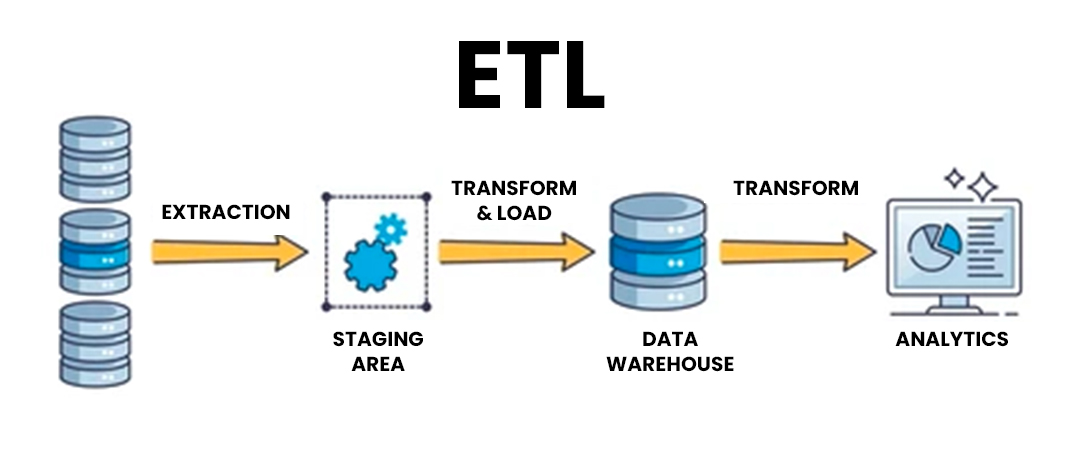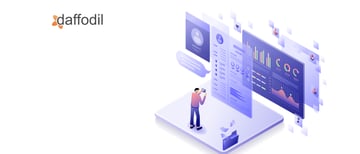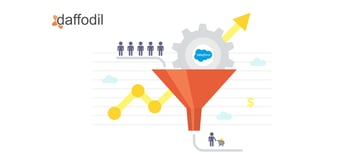.jpg?width=2917&name=BI%20Tool_2%20(1).jpg) Quintillion bytes of data get generated in a day, now imagine handling those data manually! Impossible right? It would require immoderate manpower with no surety of accuracy. As we all are aware of the fact that organizations these days run on data and thus it is a vital task to manage and organize it. The data is received from multiple sources and stored at a centralized repository for usage, such as a data warehouse.
Quintillion bytes of data get generated in a day, now imagine handling those data manually! Impossible right? It would require immoderate manpower with no surety of accuracy. As we all are aware of the fact that organizations these days run on data and thus it is a vital task to manage and organize it. The data is received from multiple sources and stored at a centralized repository for usage, such as a data warehouse.
Managing data can be a tedious task, with no guarantee of accuracy, if it’s managed manually. That is why automation tools are introduced that's enabling businesses to manage data and derive insights from it.
In this post, we'll discuss a data automation tool that enables businesses to manage their data in three steps- extract, transform, and load. It's called the E-T-L tool. Let's understand what an ETL tool is, how it works, why businesses need an ETL tool, and how to choose an ETL tool. The upcoming segment cover answers to all these queries.
What is an ETL Tool?
Nowadays getting valuable insights from the data has become very crucial for future business strategies and decision-making. The process of ETL plays a salient role in data integration strategies.
ETL stands for extract, transform, and load. It is the process of transferring unrefined data from one or more root systems into the target storage of choice. In other words, it is a method that pulls data out from disparate source systems and then converts or transforms the data by implementing queries like- aggregations, concatenations, etc., and finally pushes the data into data marts or data warehouse systems.
It allows businesses to gather data from multiple sources and consolidate it into a centralized hub. This process requires active participation from various stakeholders including analysts, developers, and testers, and is technically challenging.
As market flow changes, your business needs to change as well and so is your data warehouse to maintain its value as a decision-maker. Though, in order to have a flawless business intelligence system in place, it is significant to adopt an ETL tool.
ETL consists of three steps-
1) Extract
2) Transform
3) Load
- Extraction- In the first step, data is extracted from a root source like Salesforce, Spreadsheets, etc into a staging area. This acts as a temporary holding area for the data before transformation rules are applied to it. Seeing as how data come from multiple different sources, it is highly plausible that the data formats vary from one another, and directly punching those data into the data warehouse may result in distorted data.
The major challenge in the extraction phase is how ETL tools handle structured and unstructured data. All of those unstructured data can be in the form of images, emails, webpages, etc., can be complicated to extract without an accurate tool and you may have to create a custom solution to assist you in moving data.
- Transformation- During this step, the ETL tools perform various operations like organizing, aggregating, sorting, etc. on the extracted data. All of the data from disparate sources with different formats get converted and normalized into a single file format to avoid any corruption in data.
- Loading- After the transformed data, it gets loaded into your data warehouse. The data can be loaded in small batches or all at once, depending on your business requirement. The loading process will depend upon the data source, ETL tools, and various other reasons. The speed and period of loading completely depend on the needs and vary from system to system.
Why do we need ETL tools?
Legacy systems with traditional databases cannot answer complex business questions, that can only be answered by ETL.
a) It enables businesses to retrieve historical data that is helpful in providing context and an in-depth comprehension of the company as time passes.
b) It enhances and provides seamless business intelligence solutions for decision-making.
c) It brings out meaningful patterns and insights, coverts assorted data in a consistent format.
d) It integrates data from external suppliers, partners, and recent corporate mergers or acquisitions.
e) It enables a common centralized hub or data repository for better accessibility and allows sample data comparison between the source and target system.
f) It helps to boost productivity as it codifies and reuses without additional technical skills. Henceforth, developers and analysts can actually give time for the business analysis and its growth rather than investing time in making custom tools for analysis.
Factors that you should focus on while ETL tools for your business
An ETL tool automates most of the workflows in the company without needing human intervention. These tools aid in making data both comprehensible and accessible in the desired location. It also provides a highly available service. Henceforth, choosing a perfect ETL tool plays a vital role in future use cases. Below are the common criteria that you should keep in mind:
1) Data Complexity- It is an important factor to consider while choosing which ETL tool would be beneficial for your organization. If your company is small and the dataset is not complex, then you don't need a robust software solution, rather prefer the simpler one.
2) Seamless connectivity between data - No matter where the data comes from, in whichever formats, be it structured or unstructured, ETL tools should be able to extract, normalized it into a single format, and then, delivers it to the desired location.
3) Technical proficiency- It is vital to examine the end-users of these software tools, whether they are tech-savvy or not, if they are a developer then they may opt for tools that require applying complex queries otherwise they can opt for automated tools.
4) Scalability- Moving, merging, and changing data necessitates some major processing power so, it is crucial that your ETL tool can scale with your future data growth. Also, make sure that it allows modifications with simple drag-and-drop movements.
Also read- Business Intelligence Services: Why Are They Crucial For Companies In 2022?
Top 5 tools that every business analyst should know:
1) Informatica - Informatica PowerCenter is one of the finest ETL tools offering data integrations to popular Cloud Data Warehouses like Teradata MLoad, Amazon Redshift, etc. It is not too expensive and the ease of use that it provides to its users is impeccable. It's easy to learn and hence helps in cutting the cost of employee training as well.
2) ADF (Azure Data Factory)- With Azure Data Factory, even a non-tech user can easily access it because of its simplicity. It is cost-effective, provides a fully functional data integration service, and helps in deriving valuable insights for business growth.
3) IBM Datastage- Organisations with legacy infrastructures tend to blindly go with IBM Datastage for ETL tool, as It leverages a virtual system to construct Data Integration solutions with 30% faster efficiency.
4) Blendo- The Blendo platform allows you to enhance your business intelligence system with its features like customizable templates, schemas, etc., also helps you in saving your valuable time where can create integrations with inputs like HubSpot, Salesforce, Shopify, MySQL, Google Ads, so on in just a few minutes.
5)Skyvia- A Cloud platform with no-coding data integration that provides cloud-to-cloud storage, ensuring high flexibility, agility, and scalability. It is feasible for all kinds of organizations, be it small or large, you can easily move your business data with just a few clicks.
Use ETL Tools to Empower your Business
In this tech-savvy world, the practice of ETL tools ain’t only limited to using data warehouses but contributes to business growth as well. An ETL tool will permit you to make adjustments to your data management infrastructure easily. So, given the time and labor involved with manual data migration, it is advisable to make the most of the use of Daffodil’s business intelligence services for organizational growth.
To understand how our BI services expert can help your business is seamless extraction, transformation, and loading of data, schedule a free consultation call with us NOW!



